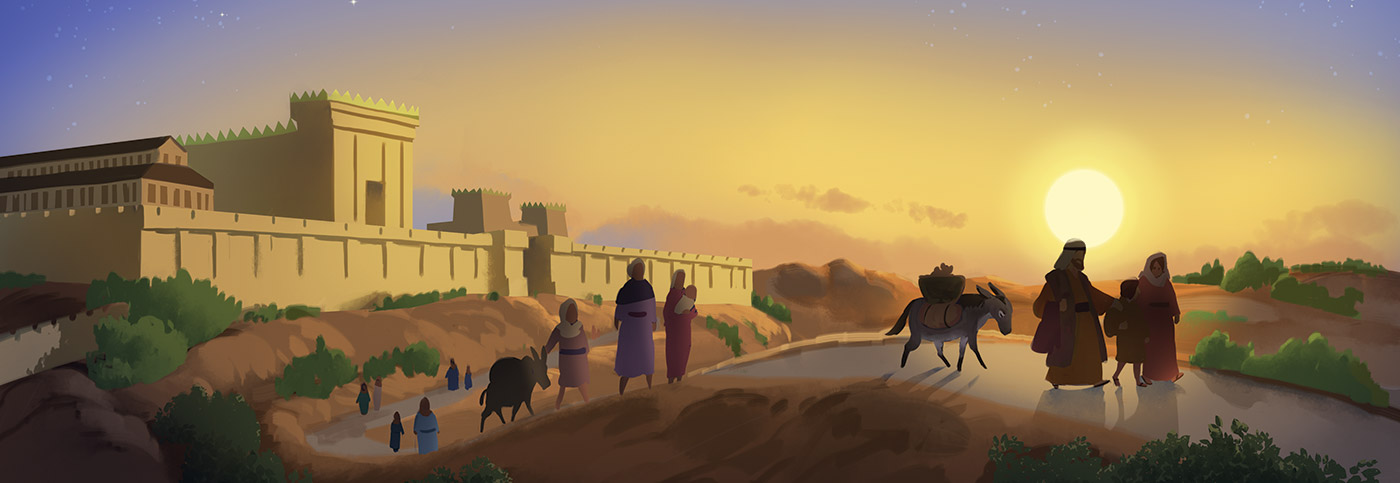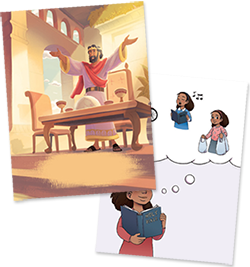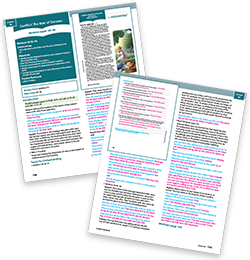BJU Press’s elementary Bible product line is constructed around 147 foundational Bible Truths (grade 1–3). These Bible Truths are studied in a systematic way, moving through the big story of the Old and New Testaments and leading students to appreciate God’s grand design for mankind and creation (grades 4–5). Elementary Bible strives to instill a greater love for God and His Word by encouraging consistent Bible reading HABITs, singing, and regular Scripture memorization. Elementary Bible helps to bridge the gap between head knowledge and heart knowledge by guiding students as they study, interpret, and apply a biblical worldview.
Vision
To equip students to begin a relationship with Christ by laying a foundational knowledge of biblical doctrine and the storyline of Scripture and by providing opportunities for students to understand, analyze, and apply Scripture to their lives.
Goals
- To equip students to read, interpret, and apply the Word of God to their lives
- To teach Bible study skills through modeling and guidance
- To recognize the Bible as the ultimate authority for faith and practice
- To expose students to the Creation, Fall, Redemption storyline of the Bible
- To teach basic Bible doctrines through biblical narratives
- To establish students’ belief and confidence in the absolute truth of God’s Word
- To present the gospel so students can know and testify of Christ as their Savior
- To communicate the basics of a biblical worldview for obedient living in God’s world
Program Approach for Elementary Bible
Reading, Interpreting, and Applying the Bible to Life
To grow in their spiritual walk, students must learn to study the Bible for themselves. So even as they learn how to read, they must also begin learning how to read, interpret, and apply the Word of God to their lives.
In the BJU Press elementary Bible program, this begins with basic biblical literacy skills in K5 and progresses through 147 meaningful Bible Truths taught in grades 1 through 3. Finally, in grades 4 and 5, students read, interpret, and apply the Bible to their lives as they trace the big story of Scripture.
Modeling Bible Study Skills
Through guided instruction presented in the teacher editions, students will encounter examples of studying the Bible with guided practice, learning Bible study skills through modeling and then applying these skills independently.
Presenting the Authority of the Bible
The Bible is the authoritative Word of God, so it should direct every area of life. One primary goal of this Bible program is to teach and reinforce the ultimate authority of the Bible so that students can trust in, believe, and apply it to their lives. Many of the 147 Bible Truths, presented as simple question-and-answer statements, help to reinforce the Bible’s authority.
Introducing Creation, Fall, Redemption
The entire Bible is one big story of redemption, and this redemption storyline can be seen through the three-part Creation, Fall, Redemption paradigm. The BJU Press elementary Bible program introduces this paradigm early and weaves it through every chapter in every grade. Within this framework, the narratives are situated within the context of the Bible’s overarching story, focusing on the significance of the covenants.
Teaching Basic Bible Doctrines
The question-and-answer Bible Truths illuminate the basis doctrines of the Bible in age-appropriate language and depth (grades 1–3). Fundamental Bible doctrines are reviewed and key teachings and principles are emphasized across both the Old and New Testaments (grades 4–5). Students gradually grow in doctrinal understanding in both breadth and depth.
Building Belief and Confidence in the Truth
Students are growing up in a pluralistic, relativistic culture that imparts skepticism of truth and challenges authority. Yet the Bible asserts that it is absolutely true and that God is our sovereign Ruler, a perfect and all-powerful authority. These courses not only foster confidence in the truthfulness of Scripture but also provide biblical worldview lessons that connect Bible content to real life, nurturing faith and reinforcing belief in the process.
Transforming Hearts and Minds for Christ
Doctrinal instruction and study skills are useless without the transforming power of the gospel. Students will consistently encounter gospel themes of sin, redemption, and salvation and be encouraged to trust personally in Christ. As they journal their personal responses, they deepen their understanding and application of these truths.
Developing Biblical Worldview Basics
Applying God’s Word to God’s world requires discernment and wisdom, as well as viewing through the right set of lenses—through a biblical worldview. Through various themes woven throughout on knowing and loving God’s Word, linking the Old Testament to Jesus in the New Testament, applying biblical teachings in daily life, interpreting different parts of the Bible, and understanding the need for a Savior while nurturing a personal relationship with God, students will grasp the foundational aspects of this worldview and cultivate it further as they mature.
Materials
Student Worktext
Each worktext helps students apply the Bible, practice Bible study skills, and review lesson content. Colorful activities motivate young students to study and apply Scripture. K5 provides a foundation to biblical literacy through visually engaging story cards. Grades 1–3 teach students foundational Bible truths using nearly 150 question-and-answer statements (spread over three years). Grades 4–5 trace the Bible’s big story through the Old and New Testaments and provide knowledge of essential bible accounts to deepen students’ understanding of fundamental Bible doctrines.
Teacher Edition
Each teacher edition includes resources for planning lessons, engaging students, providing classroom instruction, applying that instruction to life, and assessing student understanding. Lessons include teaching strategies, discussion questions, answers, and other features that support the teacher in customizing lessons according to individual student needs.
Assessments
Each assessment packet includes one or two age-appropriate tests per unit.
Scope & Sequence
Bible Content
Chronological study of the Old and New Testaments; Bible characters include Adam and Eve, Noah, Abraham, Joseph, Moses, Joshua, Gideon, Samuel, David, Elijah, Jonah, Jesus, Peter, and Paul; Topics include learning about the Bible; Creation, the Fall, and Redemption; God’s promises to Adam, Noah, Abraham, Moses, and David; judges, priests, kings, and prophets; the captivity and return of Israel; the life of Christ; the early church; the new creation; prayer; and missions; Students will examine God’s Word from Genesis to Revelation and discover what God is doing to redeem His fallen creation; Biblical content is related to the biblical worldview shaping themes of glory, law, kingdom, and forgiveness, and students apply these principles through various biblical worldview shaping discussions and active learning strategies.
Memory Verses
32 verses
Songs
32 songs that correspond to the biblical content of each week’s content focus
Bible Content
Bible Stories from both the Old and New Testaments that demonstrate each Bible Truth; Historical figures including Adam, Moses, David, Jesus, Peter, and Paul; Doctrines including God, God’s Works, The Fall, Christ, Salvation, Christian Living, and the End Times.
Bible Living
Instruction for the students on how to make the Bible Truth a part of their lives
Biblical Worldview
Instruction on how the Bible Truths help students understand God’s creation biblically; Explanations on how nonbiblical worldviews are not true
Bible Truths
43 of the complete set of 147 questions arranged under 7 biblical doctrines
Bible Memory
43 Bible Truth responses to be memorized for knowing Bible truth; 7 memory verses to support the seven doctrinal themes
Bible Truth Songs
43 songs that help students learn the 43 Bible Truths
Bible Content
Integrates doctrine into thematic studies of the Old and New Testaments; Historical figures include Adam and Eve, Cain and Abel, Noah, Abraham, Joshua, David and Jonathan, Solomon, Daniel, Satan, Jesus, and Saul; Biblical content is related to the Biblical Worldview Shaping themes reality, identity, purpose, evil, redemption, and morality.
Biblical Worldview Skills
Students apply BWS themes through various biblical worldview shaping discussions and active learning strategies.
Character Emphasis
Character traits used in application stories show students their need of Christ as Savior and demonstrate ways to apply biblical principles to personal-life situations.
Christian Living Application
Discussion questions are used throughout to clarify understanding and aid in thoughtful application of biblical virtues; this highlights God’s promises, Justification, Sanctification, the Lord’s Supper, and Baptism.
Bible Truths for Christian Growth
51 of the complete set of 147 Bible Truths correlated with appropriate biblical themes; Review of the 43 Bible 1 Truths
Bible Memory
8 verses or passages, in addition to memorizing 51 new Bible Truths
Bible Truth Songs
51 songs correlated with the appropriate Bible Truth
Bible Content
Integrates doctrine into thematic studies of the Old and New Testaments; Historical figures include Adam and Eve, Jacob, Samuel, David, Solomon, Elijah, Daniel, Nebuchadnezzar, John, Jesus, Peter, Paul; Biblical content is related to the Biblical Worldview Shaping themes reality, identity, purpose, evil, redemption, and morality.
Biblical Worldview Skills
Students apply BWS themes through various biblical worldview shaping discussions and active learning strategies.
Character Emphasis
Discussion questions throughout and application stories show students their need of Christ as Savior and ways to apply Bible Truths to real-life situations.
Christian Living Application
Discussion questions used throughout to clarify understanding and aid in thoughtful application of biblical virtues; this highlights the Lord’s Prayer, the Ten Commandments, and End Times.
Bible Truths for Christian Growth
53 of the complete set of 147 Bible Truths correlated with appropriate biblical themes; Review of the 94 Bible 1 and Bible 2 Truths
Bible Memory
7 verses or passages, in addition to memorizing 53 new Bible Truths
Bible Truth Songs
53 songs correlated with the appropriate Bible Truth
Bible Content
A chronological study of the Old Testament; emphasizes understanding the Bible as one story with three progressive parts: Creation, Fall, and Redemption; tracks the progression of the Abrahamic, Mosaic, Davidic, and New Covenants, anticipates the fulfillment through the life of Christ; introduces Christ as the perfect Prophet, Priest, and King
Bible Study Skills
Promotes personal interaction with the Bible; emphasizes skill in reading Scripture and letting the Bible answer important questions; makes the Bible a personal companion for growing in Christ through observing, interpreting, and applying Scripture
Bible Truths
147 questions and answers that help to understand the progression of God’s revelation of Himself and major biblical events and truths for growth in Christ
Memory Verses
Accompanying memory verses for each week
Bible Content
A chronological study of the New Testament; emphasizes understanding the Bible as one story with the New Testament being the culmination of Creation, Fall, and Redemption; tracks the major themes of glory, kingdom, covenants, law/wisdom, atonement/priesthood, and divine presence throughout the life of Christ and the New Testament; demonstrates Christ as the culmination of the major themes of the Bible
Bible Study Skills
Promotes thoughtful interaction with the Bible text through questions and answers; encourages students to read and memorize Scripture on their own; introduces the students to Bible study tools such as outline headings, cross-references, concordances, dictionaries, digital Bibles, and Bible marking strategies; trains the students to observe the biblical themes throughout the story of Scripture
Bible Truths
147 questions and answers to help understand the progression of God’s revelation of Himself and major biblical events and truths for growth in Christ
Memory Verses
Accompanying memory verses for understanding and remembering major Bible principles from the lessons













